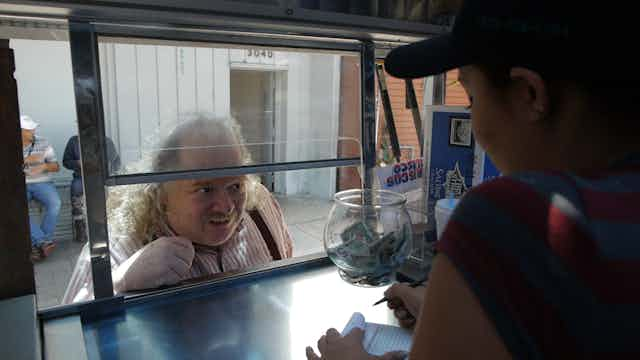Jonathan Gold, the “belly of Los Angeles” and the only restaurant critic to win a Pulitzer Prize, is in Melbourne! So what better reason do we need to see the Australian premiere of Laura Gabbert’s documentary on the man himself?
City of Gold (2015) is an engaging profile on the famed foodie and self-proclaimed “failed cellist” as he eats his way across town. Sampling everything from deer penis to slimy hagfish, Gold is an enthralling character who delights in the wonderfully diverse tastes that Los Angeles has to offer.
He has a charming curiosity for food and his willingness to try out weird and wonderful dishes dismantles the usual coupling of food criticism with high-end restaurants.
The film is beautifully shot and soundtracked by an eclectic mix of hiphop, classical and blues that perfectly captures the rhythm and vitality of the city. Gold is in fact a classically trained cellist and former punk who started his career as a music critic. Celebrating a fusion between high and low culture with genuine warmth, Gold quips that “an aria is in some way equal to a well-cooked potato”.
Gabbert’s documentary focuses on Gold’s penchant for seeking out the hidden treasures of LA: small, secluded gems that are off-the-grid and usually family-run. Drawing upon Reyner Banham’s architectural critique of Los Angeles, Gold attempts to make sense of the city through food.
Gold delights in the roaming taco trucks, alleyway eat-outs and the family restaurants that populate the shopping mall. It is here that Gold finds LA. He philosophises that these ritualised moments in time provide an experience through which community is created.
Gabbert considers the role of the restaurant critic and also touches upon the responsibilities bound up with Gold’s position as an established and privileged voice. Gold’s brother, Mark, is the Associate Vice Chancellor for Environment and Sustainability at UCLA and the former President of the environmental group Heal the Bay.

In one scene, Mark teases Jonathan about his willingness to eat endangered species and surmises that he has “to be an environmentalist because Jonathan is eating everything I’m trying to save”. This moment hints at the complexity of the food critic’s role as a public figure and the possibility of using this position to raise awareness about conservation.
But the documentary is mainly focused on the families and communities that run, support and keep alive the numerous eateries and restaurants that make up the LA food scene. Guerilla Tacos, Soban, Chengdu Taste, Jitlada, Meals by Genet, Pho Minh, Petit Trois and Earlez Dogs all get a special mention with interesting snapshots into how these places got started.
Many of these are stories of migration, financial struggle and passionate determination. These fascinating mini-narratives are a celebration of the ethnic diversity of LA and support Gold’s contention that cuisine should continually break with convention and create something new.

By providing insight into the migrant experience, Gabbert suggests a link between Gold’s work as a food critic and the importance of food in creating community. The piping hot bowls of pho, glazed duck wings and street vendor hot dogs open up the possibility of new tastes, smells and sensations.
If food defines place, this diversification articulates an exciting regeneration of the city in which new ground is continually being re-mapped and explored.
Towards the end of the film, Gold reflects on some of the significant cultural and social shifts that have defined LA. He refers to the Watts Rebellion of 1965 and the riots, lootings and fires of 1992.

Gold’s philosophy is that, similar to art and music, food allows for us to make sense of a city. By seeking out new culinary experiences and investing in local restaurants and their stories, Gold reminds us of the importance of a diverse community. His warmth and enthusiasm suggest that a healthy, functioning city is one open to new tastes, flavours and smells.
Beyond the marinated crab and salsa verde, this film is really a celebration of diversity that encourages us to seek out something just a little bit different.
City of Gold is screening as part of the Melbourne International Film Festival. Jonathan Gold will be participating in Q&A events and panels. Details here.

